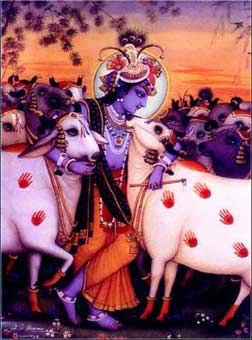All glories to Sri Guru and Sri Gauranga
Lord of the Cows
An excerpt from Loving Search for the Lost Servant
by His Divine
Grace Srila Bhakti Raksak Sridhar Dev-Goswami Maharaj
Srimad-Bhagavatam, 10.26.25
|
The very gist of the Govarddhan-lila, the very substance of the Pastime, is represented in this verse. The milkmen in Vrindavan used to observe a sacrifice to satisfy the king of heaven, Indra, at whose command the rain, clouds, and other subtle elementary powers move. The main wealth of the cowherd men is the cow, and the cow's main food is grass. Only rain can produce grass, and so the cowherd men used to perform sacrifice to satisfy the subtle power who is supposed to be in command of natural substances like rain.
By satisfying Indra, favourable rains would come and there would be sufficient grass. The cows could then graze easily on the grass and generate milk profusely. The gopas, the cowherd men and their families, used to make different preparations from the milk, sell them in the marketplace, and in that way earn their livelihood.
As the grazing ground in one place was finished, they would move from one forest to another. Only for the purpose of obtaining grass for the cows, Krishna's father Nanda Maharaj and the cowherd men would wander from one place to the next. In this way, they lived sometimes in Vrindavan, sometimes in Nandagram, and sometimes in Gokula.
Once, Krishna wanted to assert Himself and modify the worship of Indra. He wanted to establish His own domain, Vrindavan, in its pristine glory.
Although He was only a boy, He was a boy of extraordinary capacity. He was only seven years old. But in the Padma Purana it is said that the development or growth of special personalities is one and a half times that of ordinary persons. Although Krishna was only seven years old by ordinary calculation, He was eleven according to general calculation.
Krishna said, "Why should we perform this sacrifice to Indra? We have a direct concern with Govarddhan Hill and not Indra." He announced this idea to the gopas, and somehow, willingly or reluctantly, the gopas submitted to the advice of Krishna. Nanda Maharaj was influenced by affection for his son, and, because he was the king, he told them, "This time we shall worship Govarddhan Hill and not Indra."
INDRA INSULTED
And so the gopas, the milkmen of Vrindavan, followed Krishna's advice - some reluctantly and some willingly - and they began the sacrifice for Govarddhan Hill. This news reached Indra, who thought to himself: "A boy of special capacity lives there. Now He has taken the leadership of Vrindavan and stopped this ancient sacrifice to me. For a long time it was the tradition of the gopas to perform sacrifice to satisfy me, and now one boy is the cause of stopping my sacrifice!" He was very much enraged. Indra ordered the clouds and the wind and the lightning to attack the residents of Vrindavan.
According to Vedic understanding, all the elements are personified. In ancient days, the Aryans and Rajarsis, elevated human beings and great sages, used to see everything as persons. They saw everything in a personal way. They thought of the creepers, the trees, and everything else in the environment as persons. They understood that they were all persons who, according to karmma, are wandering through the different species of life.
Once I was asked by a professor of biology about alternatives to Darwinian evolution. I advised him that evolution from consciousness to matter may be understood on the basis of Berkeley's theory. Whatever we think of is really part of our consciousness. And consciousness means person. Everything that we may be conscious of is a person. We may think of the wind as an inanimate object, but it was thought of in the Vedic line as a person. Lightning, wind, clouds, and rain are all persons. Whatever we consider to be elementary matter, gross and subtle, were all considered by the ancient seers of the truth to be persons.
|
Webpages prepared by Damayanti Dasi |
http://scsmath.com | Main Centres | What's New?

